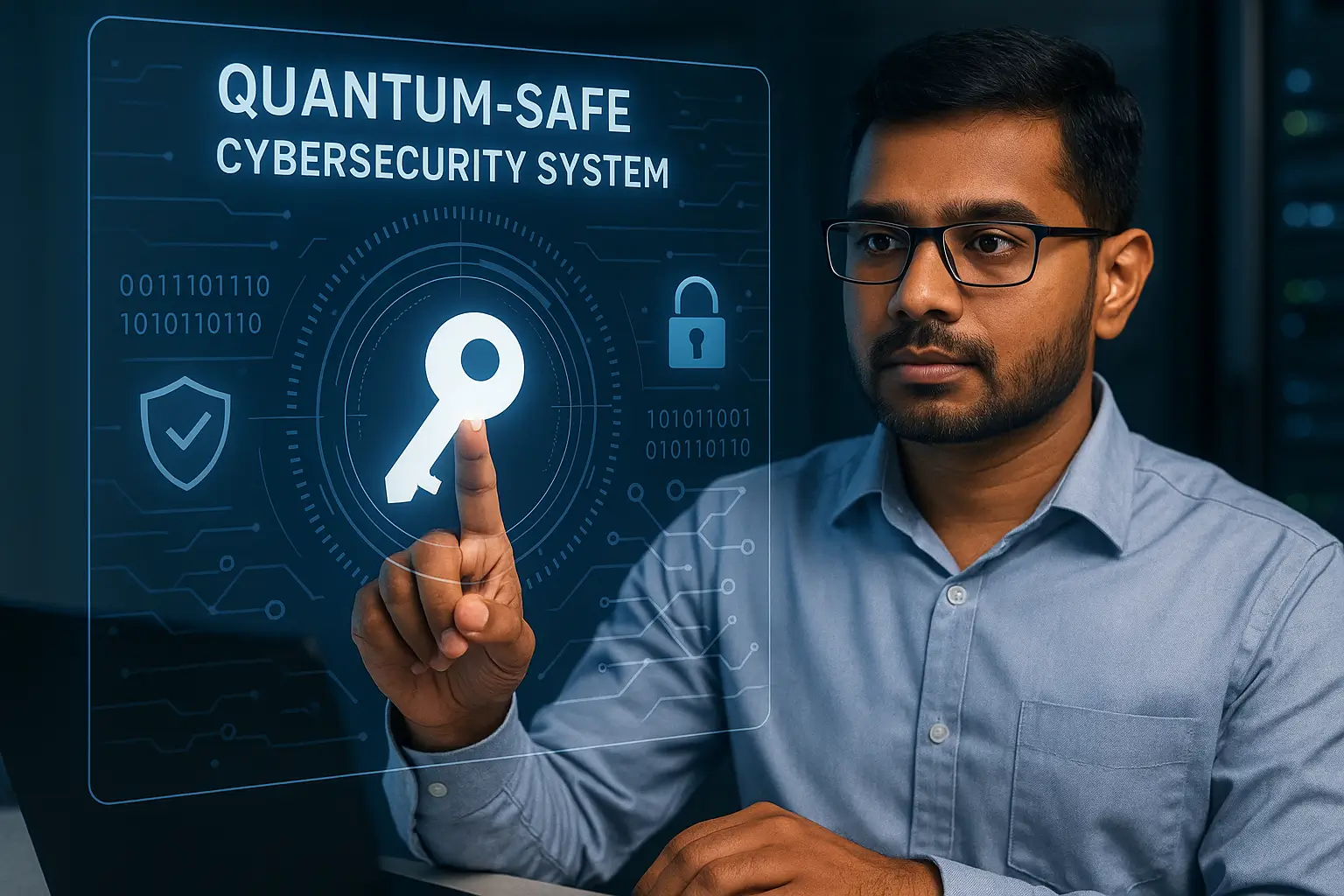Indian SMEs cannot afford to delay their transition to post quantum cybersecurity India standards — it’s today’s business concern. As India prepares for a digital leap through 6G, AI, and quantum computing, protecting sensitive data from future decryption threats has become a national and corporate priority. For Indian SMEs, the shift to quantum-safe security must begin now — before your encrypted data becomes vulnerable to retroactive breaches.
In this blog, we’ll explore what post-quantum cryptography (PQC) is, how it affects Indian businesses, and 5 practical steps SMEs can take to ensure they stay secure and compliant in the quantum era.
What Is Post-Quantum Cybersecurity?
Post-quantum cybersecurity (PQC) refers to cryptographic algorithms that are secure against quantum computers. While traditional RSA, ECC, and Diffie-Hellman methods rely on mathematical problems that quantum computing can solve in minutes, PQC uses lattice-based, code-based, or multivariate techniques resistant to such attacks.
In short: when quantum computers scale, they could decrypt today’s encrypted data. That’s why security experts call this the “harvest now, decrypt later” threat — where attackers collect encrypted data today and break it years later.
Why Post-Quantum Security Matters for India
- 🔐 India’s digital economy is projected to hit $1 trillion by 2026 — data is its core asset
- 🛰️ ISRO and DRDO are already piloting quantum-secure satellite communications
- 🏛️ The Indian government launched a ₹6,000 crore National Quantum Mission (NQM)
- ⚠️ 94% of BFSI CISOs in India feel unprepared for quantum threats
- 💼 SMEs in health, legal, e-commerce, and IT services are just as vulnerable
These trends show why post quantum cybersecurity India must be prioritized, especially by small and medium enterprises. Data leaks caused by outdated cryptography could result in regulatory fines, brand damage, and lost trust. Now is the time for SMEs in India to start their quantum transition.
What Is the “Harvest Now, Decrypt Later” Threat?
Even if quantum computers are still a few years away from breaking RSA-2048, attackers today can intercept and store your encrypted data. Once quantum computers become capable, they will decrypt this data retroactively — compromising old business contracts, government files, patient records, and financial data.
This is especially dangerous for sectors that store sensitive data for 5–10+ years: legal firms, hospitals, banks, and government contractors. Quantum-safe security is about future-proofing today. This makes post quantum cybersecurity India a critical step for future-proofing even the most basic IT systems.
India’s Leadership in Quantum Security
India is already advancing post-quantum readiness:
- QNu Labs in Bengaluru is India’s first quantum-safe cybersecurity startup offering Quantum Key Distribution (QKD)
- ISRO and DRDO are testing quantum satellite encryption
- IISc and IITs are contributing to global PQC research
- RBI and SEBI are assessing cryptographic agility policies
Despite this, awareness among Indian SMEs remains low. Most still use static encryption libraries and legacy VPNs — which will be the first to break in the quantum era.
How SMEs in India Can Get Started
Here are 5 smart, actionable tips for small and medium businesses to begin their post-quantum cybersecurity journey in India.
Post Quantum Cybersecurity India – 5 Proven SME Tips
Before implementing solutions, SMEs must understand where post quantum cybersecurity India fits into their risk landscape.
1. Assess Your Current Crypto Assets
Start with a full cryptographic inventory: identify where your systems use RSA, ECC, or SHA. Email servers, VPNs, TLS/SSL, database encryption, and cloud storage are key areas. Tools like CryptoAgility Platform or Microsoft’s PQ Crypto Readiness Toolkit can help.
2. Embrace Crypto-Agile Architecture
Crypto-agility means your system can switch algorithms without major code rewrites. Use modular cryptographic libraries (e.g., Bouncy Castle, OpenSSL 3.0) that allow smooth replacement of legacy encryption with PQC-ready options.
3. Partner with PQC Providers in India
Companies like QNu Labs offer Quantum Key Distribution (QKD) and quantum-resilient security for Indian businesses providing quantum-secure encryption aligned with post quantum cybersecurity India goals. They can audit, implement, and maintain encryption systems compliant with NIST PQC standards.
4. Watch for NIST PQC Finalization
The U.S. NIST is standardizing post-quantum algorithms like CRYSTALS-Kyber and CRYSTALS-Dilithium — expected to finalize by late 2024. SMEs in India should align their upgrades with these standards to ensure compliance and vendor compatibility.
5. Train Your IT Teams and Vendors
Cybersecurity awareness is essential. Ensure your developers, IT vendors, and cloud partners understand quantum risks. Include post-quantum security modules in annual awareness training and vendor onboarding.
Tools & Resources for SMEs in India
| Tool | Purpose | Provider |
|---|---|---|
| Open Quantum Safe | PQC Algorithm Library | Open-source (GitHub) |
| CryptoAgility Platform | Cryptographic asset discovery | AppViewX |
| QNu Labs QKD | Quantum Key Distribution | QNu Labs (India) |
| NIST PQC Readiness Toolkit | Roadmap and assessment | U.S. NIST |
| Microsoft PQC Analyzer | Inventory tools for enterprise | Microsoft |
FAQs – Post Quantum Cybersecurity India
Is quantum cybersecurity only for large companies?
No. SMEs in India store sensitive data too — like legal documents, health records, and financial details. They are just as vulnerable to harvest-now-decrypt-later attacks.
What is the cost of PQC implementation?
For most SMEs, the initial audit and crypto replacement can be completed within ₹1–3 lakhs. Government incentives under Digital India may soon subsidize these upgrades.
When will quantum computers break current encryption?
Experts estimate within 5–10 years. However, sensitive data stored today could still be decrypted in the future — making proactive protection essential now.
What Indian regulations support PQC?
Currently, RBI and SEBI recommend crypto-agility for BFSI. National Quantum Mission and DRDO efforts may soon extend to civil use cases and SMEs.
How can Right Web Solution help?
Right Web Solution offers cybersecurity consulting, training, and technical implementation tailored for Indian SMEs — including PQC migration support, audits, and awareness programs.
How do I start with post quantum cybersecurity India?
Begin with a cryptographic audit, identify weak points, and work with certified Indian vendors offering PQC-aligned solutions.
🔗 Internal Links
🔗 External References
Is your SME ready for the quantum era? Let Right Web Solution guide your SME through the shift to post quantum cybersecurity India with actionable, affordable solutions. Start your quantum-safe transition with expert help from Right Web Solution. Stay compliant, secure, and future-proof your business today.
📞 Call: +91 8850 907518
📩 Email: hello@rightwebsolution.com
🌐 Website: https://rightwebsolution.com










1 Comment
Top 5 Cybersecurity Risk Assessment Steps India SMEs
July 11, 2025[…] Post Quantum Cybersecurity India […]